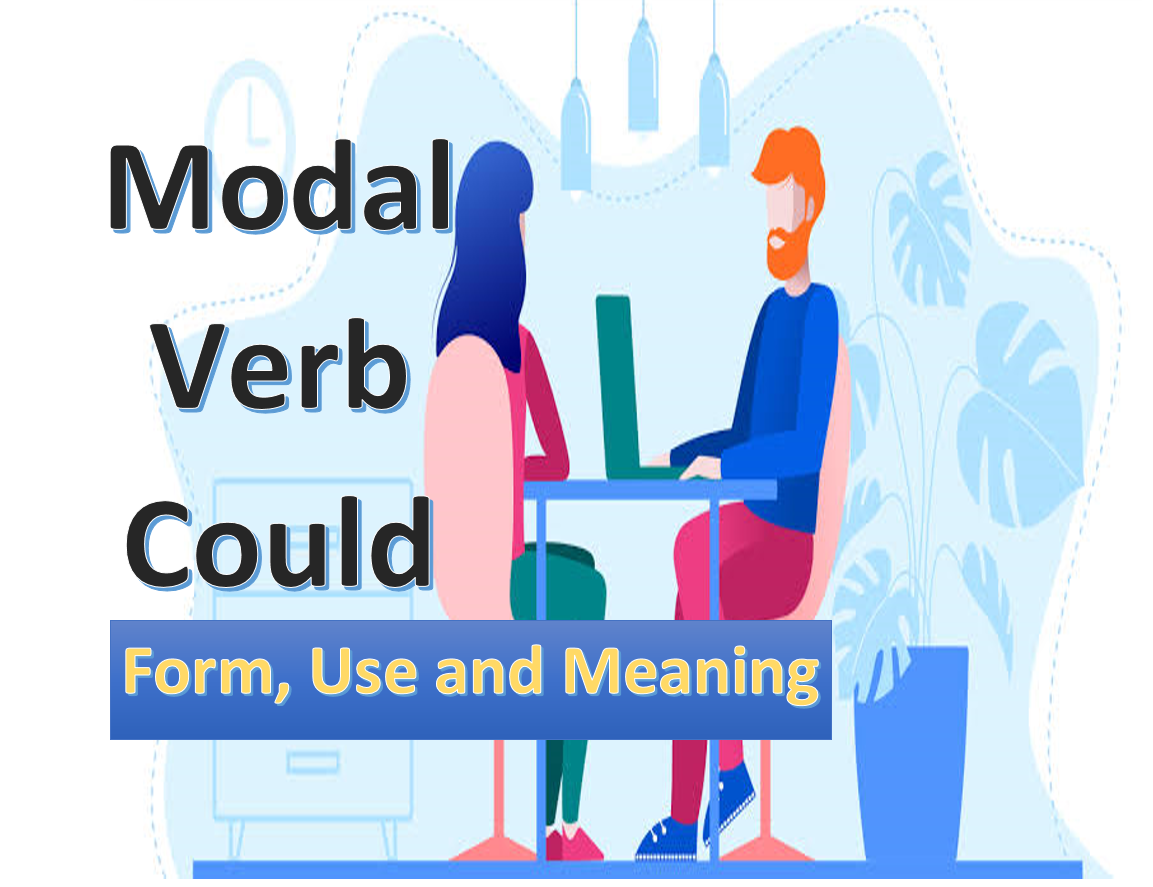Modal Verb Could – Form, Use and Meaning in English
In this complete tutorial for beginners’ learners are going to learn the modal verb “could”; its form, use and meanings. “Could” is a modal verb used to express possibility or past ability as well as to make suggestions and requests and you can broaden your knowledge about it with examples and forms. Also, for indirect speech (reported speech) to express ability in the past, to describe sensations in the past and finally to describe mental processes in the past.
Watch the video here before we discuss the modal verb “could” meaning.
“Could” is also commonly used in conditional sentences as the conditional form of “can.”
So again “Could” is a modal verb. pronunciation /kʊd/
Let’s look at into this in details. First of all, we will look at
- could in the affirmative form;
Subject + could + base form
I could cook we could cook
you could cook you could cook
he could cook they could cook
she could cook
it could cook
– could in the negative form
Full form Contracted form
Subject + could not + base form Subject + couldn’t + base form
I could not cook I couldn’t cook
you could not cook you couldn’t cook
he could not cook he couldn’t cook
she could not cook she couldn’t cook
it could not cook it couldn’t cook
we could not cook we couldn’t cook
you could not cook you couldn’t cook
they could not cook they couldn’t cook
- could in the question form
could + subject + base form…?
Could I cook…?
Could you cook…?
Could he cook…?
Could she cook…?
Could it cook…?
Could we cook…?
Could you cook…?
Could they cook…?
Now let’s look at the use and meaning;
1. a. We use could to express possibility in the present and future.
Compare
| Present | |
| It’s blue. I am certain that it is blue. It’s a fact. | It could be blue. I’m not certain that it is blue. |
| Future | |
| The storm will get worse. I’m certain that the storm will get worse. | The storm could get worse I’m not certain that the storm will get worse. |
b. We can also use could to express possibility in the past.
-We use could have + past participle form to talk about possibility in the past.
Modal Verb “Could” Examples:
I could have stayed in the park the whole day but I chose to go to the cinema.
I could have been a lawyer if I didn’t study computer science.
I could have bought an iPhone but I decided to save my money.
c. We often use “could have + past participle in the following situations:
– to express regret
Another Examples of Modal verb “could” forms:
I could have been a professional tennis player.
I could have been on tour.
- To criticize someone if they did not do something
You could have cleaned the house instead of playing games.
Why did you drive the car? You could have taken a taxi!
2. Could – to make a suggestion
We use could to make a suggestion or proposal.
More examples of Modal verb “could” forms:
a. I need to buy some books, but I don’t have enough money.
b. You could talk to your mother and ask her to give you some money.
Situation:
Your friend
cannot reach Jane by cellphone.
Your suggestion: You could try her home number.
3. Could – to ask for permission
We use could to ask for permission or to request for something.
Could I use your laptop?
Could I borrow your car?
Could you tell me how to get to the bus station, please?
Could you help me finish my project in Science?
Could you say thanks to your mum for me?
4. Indirect speech (reported speech)
When we use indirect speech, we use “could” after past reporting verbs “can” was used in direct speech.
Direct speech
Anne said, “We can visit her on Saturday”.
Indirect speech
Anne said that we could visit her on Saturday.
Direct: He said, “I can swim.”
Indirect: He said that he could swim.
5. We use Could to express ability in the past.
When Helen was 5 years old, she could play the piano for three hours.
Tom could read before he started school.
She could paint when she was three years old.
6. We use could with verbs in the senses to describe sensations in the past.
smell
taste
could + see
hear
touch
My neighbors were fighting I could hear it.
My mom put too much salt on the soup. I could taste it.
John drinks alcohol. I could smell it.
7. We use could with verbs of mental processes to describe mental processes in the past.
believe
remember
could + think
understand
Examples:
She walked slowly. I could understand her.
Mary broke the glass. She could think I was mad.
I wanted to write my friend but I couldn’t remember her
address.
So that’s the end of this lesson, hope you enjoyed it, and starts to use the modal verb “could” appropriately.
For more readings
- There is vs There are How to Choose? -Learn to Speak English Fast
- Phonics ea Words Vowel Team “EA” Complete Tutorial
- Consonant Blends “fr” Words as in Frog With Sample Excercise
- Words with o Sound As In Pot
If you have any questions or suggestions about Modal verb Could Form use and meaning, please feel free to leave a comment below or send us a message using our contact page.


